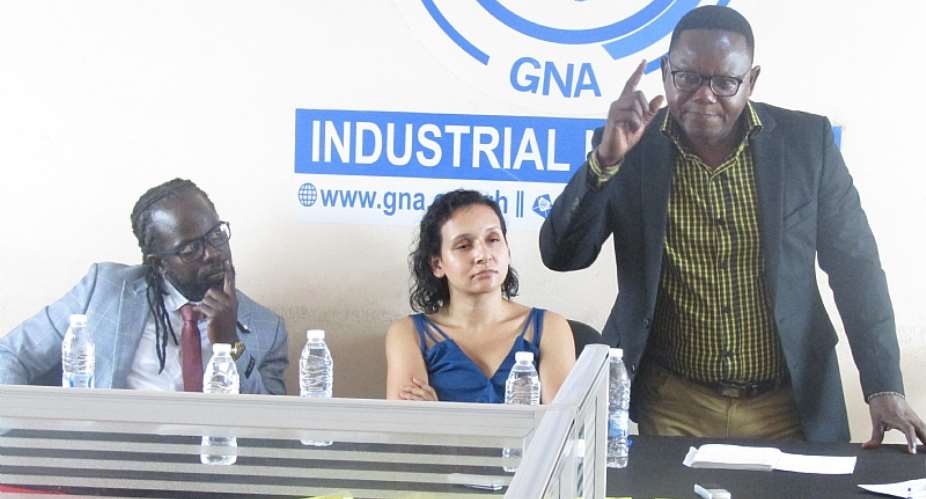Incompetent management of competent agricultural policies are the fundamental elements of the current food shortage the nation is experiencing the General Agricultural Workers Union (GAWU) has revealed.
Mr. Edward Kareweh, GAWU General Secretary explained that formulating the right policies and allowing it to be championed by competent leaders would improve crop productivity and product quality along the agricultural value chains.
However, "things are not done properly. Incompetent application of laudable policies had created a problem where food is cheap at the farm but expensive on the final side of the value chain that is at the consumer gate.
“Each player in the agricultural value chain has a unique role to play and has different operational needs but unfortunately policy implementers box all into one big box during the implementation stage which has weakened some of the knobs in the chain, subsequently the nation is paying for it”.
Mr. Kareweh stated at the 15th Monthly Stakeholders Engagement and Workers’ appreciation day seminar organized by the Ghana News Agency's Tema Regional Office, which aimed at providing a platform for both state and non-state organizations to address national issues to enhance development as monitored by the Communication for Development and Advocacy Consult (CDA Consult) in Tema.
The event also served as a motivational mechanism to recognize the editorial contribution of reporters toward national development in general, growth, and promotion of the Tema GNA as the industrial news hub.
Speaking on the theme: "Ghana's Agricultural Value Chain," Mr. Karewh said there was the need for the government to create an enabling environment to help facilitate linkages between core value chain actors and support services including financial services, technical advisers, and mechanization services to producers.
According to the GAWU General Secretary, poorly formed relations along most agricultural value chains in the country were fostering a high degree of predatory behaviour between actors, affecting the sector negatively.
This predatory, he explained, also worsens and weakens the reinforcing system that limits investments and decreases efficiency and resiliency, preventing competitiveness which in the long run affects the incomes and willingness of the ordinary farmer to purchase inputs.
He argued that government policies must provide specific incentives to agricultural equipment dealers and users to help expand smallholders as key stakeholders.
"So we must not blow our own trumpets that we are working. Let those we are serving judge. We must not praise a project because of its beautiful features, we must rather do that after seeing results," he said.
He also revealed that the country currently lacks effective structural policies to optimize the competitiveness of the agricultural value chain.
Enhancing the competitiveness of the agricultural value chains demands improvement in productivity along the specific value chains for an effective and efficient input supply system, Mr. Kareweh, GAWU General Secretary has stated.
Mr. Kareweh stated that the financial sector was weak and poorly structured to take on capacity-building investments needed to effectively support the agricultural sector in general, specifically the equipment sector, which was hindering the value chain from its massive potential.
He noted that wholesalers had limited interest in building branded retail channels which passes through to the farmer making it less important as a leverage point for improving broader and more appropriate access for smallholders.
He added that there were larger retailers with multiple outlets that were keenly interested in expanding their distribution networks but were concerned by the risks and cost of setting up new stores because of a failed economic system adding that the country needs a structural bailout and not an International Monetary Fund (IMF).
Other speakers at the stakeholders’ engagement were: Mr. Richard A. Quayson, Deputy Commissioner, Commission on Human Rights and Administrative Justice; Mr. Richard Kovey, a convenor at Campaign Against Privatization and Commercialization of Education (CAPCOE); and Mr. Papi-Paulo Zigah, Director of International Operations, Future Careers Ghana.






 Dumsor: Don't rush to demand timetable; the problem may be temporary — Atik Moha...
Dumsor: Don't rush to demand timetable; the problem may be temporary — Atik Moha...
 Space X Starlink’s satellite broadband approved in Ghana — NCA
Space X Starlink’s satellite broadband approved in Ghana — NCA
 2024 election will be decided on the grounds of the economy; choice of running m...
2024 election will be decided on the grounds of the economy; choice of running m...
 Dumsor: We're demanding less; just give us a timetable — Kwesi Pratt to ECG
Dumsor: We're demanding less; just give us a timetable — Kwesi Pratt to ECG
 Do I have to apologise for doing my security work, I won’t – Simon Osei-Mensah r...
Do I have to apologise for doing my security work, I won’t – Simon Osei-Mensah r...
 All my businesses have collapsed under Akufo-Addo — NDC Central regional chair
All my businesses have collapsed under Akufo-Addo — NDC Central regional chair
 Military, Prison Officers clash in Bawku, three injured
Military, Prison Officers clash in Bawku, three injured
 GRA-SML contract: MFWA files RTI request demanding KPMG report
GRA-SML contract: MFWA files RTI request demanding KPMG report
 Court threatens to call second accused to testify if NDC's Ofosu Ampofo fails to...
Court threatens to call second accused to testify if NDC's Ofosu Ampofo fails to...
 Family accuses hospital of medical negligence, extortion in death of 17-year-old...
Family accuses hospital of medical negligence, extortion in death of 17-year-old...
